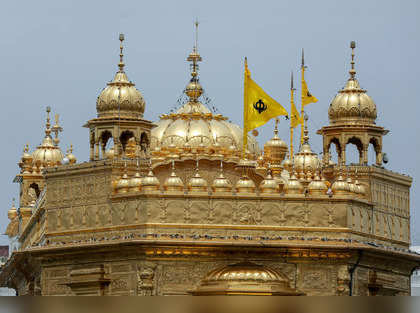Akal Takht's recent summoning of former Punjab ministers to apologize for past violations has raised concerns about a potential Khalistani revival. This situation brings back memories of the 1980s' terrorism era. With separatists gaining ground in recent elections, there is growing apprehension about renewed extremism and its implications for Punjab's stability.
During British Raj, colonial rulers had a saying drawing on the Bible – in India, a cloud no bigger than a man’s fist could quickly expand and become an almighty storm. Recently, Punjab witnessed a small cloud that most people ignored. But some of us feared it might expand into a new Khalistani storm.
Last month, Akal Takht, religious seat of the Sikhs, summoned 17 Sikh ministers of the Akali Dal-BJP government that ruled from 2007 to 2017 to apologise for their grievous errors and violations of the Sikh creed while in office. Their sins included failure to nab culprits who desecrated a copy of Guru Granth Sahib in 2014, and condoning an act of sacrilege by Dera leader Gurmeet Ram Rahim Singh. The ministers immediately apologised.
Sukhbir Singh Badal, CM in 2007-17, was declared ‘tankhaiya’, or excommunicated. Badal immediately visited the Golden Temple to ‘humbly apologise’ and accept any punishment from Akal Takht. The outcome is unclear.
In a secular country, CMs are not expected to kowtow to a religious authority for political acts. But that’s what happened in the terror-filled 1980s. Then, Akal Takht excommunicated Zail Singh, although he was president and earlier Congress CM of Punjab. It similarly proscribed another political foe, Congress CM Beant Singh, to whom goes the credit for finally quashing Khalistani terrorism in 1992-93. For this, a Sikh militant later killed him.
Terrorism in the 1980s was stoked by Jarnail Singh Bhindranwale, a charismatic Sikh leader demanding a separate Khalistan. In 1984, Akal Takht allowed him to start operating from within the Golden Temple, where he executed opponents in gruesome fashion.
In October 1984, Indira Gandhi ordered the army to attack the Golden Temple to oust Bhindranwale. But most Sikhs viewed this as an attack on the sacred heart of Sikhism. Gandhi’s two Sikh bodyguards were so incensed, they assassinated her. In retaliation, outraged Hindu mobs killed some 3,000 innocent Sikhs in Delhi.
The Rajiv Gandhi-Harchand Singh Longowal pact of 1985 aimed to restore peace to Punjab by letting Akalis come to power. But peacemakers fared badly in this era. Longowal was soon assassinated by Khalistani militants.
His successor, Surjit Singh Barnala, sought to contain militancy. In 1986, around 400 Sikh militants established themselves in the Golden Temple and declared a separate Sikh state. When negotiations failed, Barnala used commandos and police to oust and arrest the separatists.
That is surely what a CM must do in a crisis. But Akal Takht, which declined to oust the militants itself, was outraged by Barnala’s ‘attack’ on the Golden Temple, and excommunicated him. Barnala humbly begged the Takht for forgiveness. He accepted the Takht’s punishment – polishing shoes of devotees for a week at a Sikh shrine.
The sight shocked many. That abnegation eroded the state’s authority and credibility. It encouraged Khalistani terrorism to soar. Today, Akal Takht’s new tankhaiya pronouncements revive bad old memories and give some of us goosebumps.
In the 2024 general election, Akali Dal was reduced to a single seat even as two independents from Punjab with separatist support won handily. One, Sarabjit Singh Khalsa, is the son of one of Indira Gandhi’s killers. The second, Amrit Pal Singh, was widely seen as aspiring to become a second Bhindranwale. He was in jail under the National Security Act as a pro-Khalistan risk and could not campaign. Yet, he won handsomely.
Most Indians think Punjab decisively rejected Khalistan and religious terror in the 1980s, and this now has no support in Punjab. Alas, that is simply not true. Those outside Punjab may view Bhindranwale as a failed terrorist. But within the Golden Temple complex, Akal Takht has allowed a temple to Bhindranwale to be built, hailing him as a heroic defender of Sikhism.
No government in New Delhi has dared fight Akal Takht on this issue. Central politicians prefer to cross their fingers and avoid raking up the past. But after the sterling performance of separatists in the general election, only the naive can be optimistic.
GoI believes, with good reason, that the Sikh diaspora is stoking Khalistani sentiment today. GoI has denied any role in the killing of a Sikh separatist in Canada and a failed assassination of another separatist in the US. But social media is gleeful at what it sees as Mossad-like toughness.
Sorry, but the battle against separatism cannot be fought on foreign soil. The problem lies here. It must be tackled here. Sadly, nobody has a clear idea how to do it.


